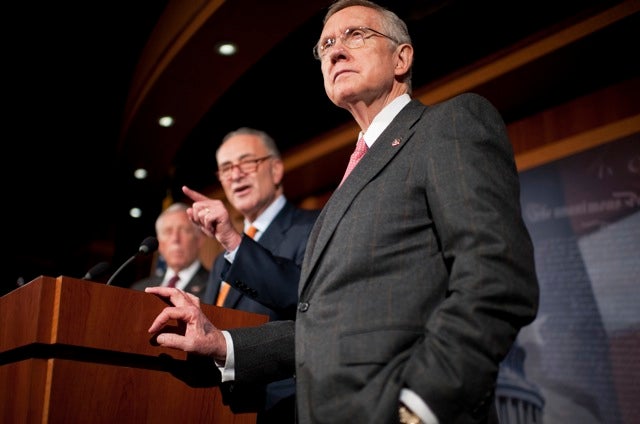As Senate Majority Leader Harry Reid (D-NV) must know, Americans who own firearms have a special sensitivity to a “Big Brother” federal government that wants to keep centralized records on who owns what guns and where in America. Loose language in his gun control bill (S. 649) could start America down that slippery slope.
Since the Second Amendment guarantees to the people the right to keep and bear arms, many Americans look askance at efforts to create centralized records that might some day, in some distant future neither wanted nor expected, facilitate a despotic government’s efforts to disarm the populace or ensure that its supporters but not its opponents possess arms. Some Americans look at history and view that concern as far-fetched; others look at history and see careful attention to that concern as essential to maintaining freedom.
Congress has attended carefully to the concern about a federal gun registry in the past. Thus, for example, section 103(i) of Public Law 103-159 (18 U.S.C. 922 note) regarding the National Instant Criminal Background Check System (NICS) provides:
No department, agency, officer, or employee of the United States may–
(1) require that any record or portion thereof generated by the system established under this section be recorded at or transferred to a facility owned, managed, or controlled by the United States or any State or political subdivision thereof; or
(2) use the system established under this section to establish any system for the registration of firearms, firearm owners, or firearm transactions or dispositions, except with respect to persons, prohibited by section 922(g) or (n) of title 18, United States Code, or State law, from receiving a firearm.
Unfortunately, the Reid legislation deviates from this strong guarantee that protects against misuse of the NICS process to start a national firearms registry.
Title I of the Reid gun control bill purports to “fix gun checks.” The proposed “fix” in section 122 of S. 649 is to take away an individual’s right to sell or give away a firearm to another individual unless, in most cases, the individual uses a licensed importer, dealer, or manufacturer to make the transfer of the firearm.
In a departure from section 103(i) of Public Law 103-159, section 122(a)(4) of the Reid bill enacts a new section 922(t)(4)(B)(ii) of title 18 of the U.S. Code to direct Attorney General Eric Holder to issue regulations “requiring a record of transaction of any transfer that occurred between an unlicensed transferor and an unlicensed transferee.” The legislation does not define the term “record of transaction,” does not specify any limitations on who creates and who keeps the record of transaction, and does not explicitly incorporate the existing prohibition on a national firearms registry.
Thus, the loose language could be construed to allow the Department of Justice itself (or another agency specified by the Attorney General) to keep centralized records of who received what guns and where, by sale or gift from one individual to another. Any provision of a bill relating to firearms that authorizes the Attorney General to issue regulations should explicitly be made subject to section 103(i) of Public Law 103-159 to eliminate any risk of misconstruction of the provision to allow creation in whole or in part of a national firearms registry.
We Americans owe it to ourselves and our posterity to see that neither Senator Reid’s bill, nor any other legislation concerning firearms, waters down the strong protection against a national firearms registry contained in section 103(i) of Public Law 103-159. The freedom we save may be our own.























